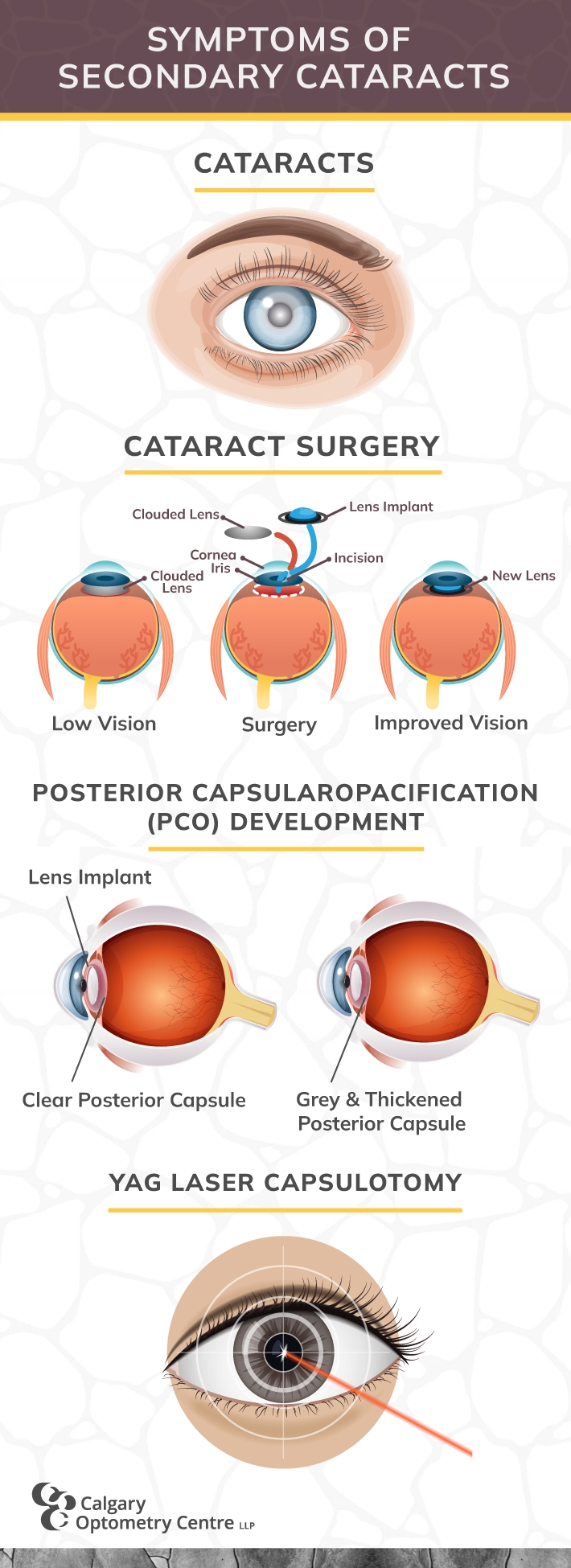Cataracts are the clouding of the eye’s natural lens. They develop painlessly and slowly over time, usually due to natural age-related changes in the eye, but can occur for other reasons.
The most effective treatment for cataracts is surgery, which involves removing the cloudy lens and replacing it with an artificial lens. Artificial lenses can’t develop cataracts, so cataracts won’t return after surgery. However, some individuals may develop a “secondary cataract,” where the back part of the lens capsule becomes cloudy.
What Are Cataracts?
Cataracts are the most common cause of vision loss in Canada, affecting over 3.5 million people. They develop in the lens of the eye, which is responsible for focusing light so we can see clearly.
As we age, our bodies undergo gradual changes, including the lens. Over time, the proteins in the lens break down and clump together, creating cloudy areas that block some or all of the light from reaching the retina, resulting in blurred, dim, or distorted vision.
Cataracts can be caused by age, genetics, trauma to the eye, or side effects from certain medications.
What Is the Impact of Cataracts on Vision?
Cataracts develop slowly, so you may not notice them during the earliest stages. As they progress, they can cause:
- Dull or blurry vision
- Faded colours
- Light sensitivity
- Trouble driving at night
- Halos or ghost images
- Double vision
Mild cataracts can be improved with prescription eyewear or stronger lighting, but as they worsen, they may interfere with your daily life. When this happens, you may need cataract surgery.

What Is Cataract Surgery?
If your cataracts are preventing you from doing the things you love (like reading or sewing) or interfering with your daily activities (like driving or using a computer), your eye doctor may recommend removing them with cataract surgery. Cataract surgery is one of the most common surgical procedures performed in Canada, and is low-risk, effective, and can help restore your vision.
During the surgery, your clouded lens is removed and replaced with an intraocular lens (IOL) implant, usually a single-vision prescription for distance. Because of this, some individuals may still require glasses for certain activities even after successful surgery. Multifocal IOLs are available, but Alberta Health Care may not cover the cost of this premium implant. It’s important to talk about cost, coverage, and post-surgical expectations with your eye doctor so you’re prepared for all aspects of the procedure.
The surgery itself is performed by an ophthalmologist, an eye surgeon. The procedure takes about 20 minutes and is typically done on an outpatient basis, meaning you can go home the same day.
There’s a lot to consider before deciding if cataract surgery is right for you. Your eye doctor can help you understand the risks, benefits, and options so you can make an informed decision.
What Causes Cloudiness in the Eye After Surgery?
While cataract surgery is safe and effective for many, it’s not entirely without risk, and like any surgery, there’s a chance of complications. One of the most common complications is “secondary cataracts.” Secondary cataracts aren’t technically cataracts but rather the clouding of the thin membrane (the lens capsule) surrounding the lens, called posterior capsular opacification (PCO).
PCO occurs when the back part of the lens capsule, where the artificial lens was placed during cataract surgery, becomes cloudy or thickens over time, causing vision to become hazy or blurry, much like cataract symptoms. It can occur months or even years after surgery.
PCO may form as part of your eye’s healing process after surgery and can be removed with a quick laser procedure called YAG laser capsulotomy. This procedure can be highly effective and doesn’t require incisions or anesthesia.
What Should I Expect After Cataract Surgery?
After your cataract surgery, it’s normal for your eyes to feel a bit sensitive or sticky. You might experience mild discomfort or blurry vision, but these symptoms usually improve within a few days.
Follow your surgeon’s instructions for using prescribed eye drops and medications to help your recovery go more smoothly. You’ll also be required to attend follow-up appointments so your healing process can be monitored. You may be given a protective shield to prevent accidental rubbing or pressure on your eyes while you sleep.
You should avoid strenuous activities, heavy lifting, or bending over immediately after surgery to give your eyes the necessary time to heal. Most people can resume normal daily activities within 1 to 3 days after surgery, but your eye doctor or surgeon will provide you with specific guidelines based on your individual recovery.
While recovery is usually smooth, if you experience severe pain, sudden changes in vision, or increased redness in the eye, contact your eye doctor immediately for guidance and evaluation.
How to Prevent Cataracts
Many eye diseases, cataracts included, aren’t necessarily preventable, but you can make some lifestyle choices to help support your vision and overall eye health:
- Attend regular eye exams with your eye doctor to help monitor your health and detect issues early.
- Wear UV-protective sunglasses outdoors to shield your eyes from harmful rays—aim for 100% UVA and UVB protection.
- Opt for a balanced diet rich in fruits, vegetables, and omega-3 fatty acids to support eye health. Foods like leafy greens, fish, nuts, and citrus fruits contain vital nutrients for eye function.
- Quit or reduce smoking to lower your risk of cataracts and age-related macular degeneration (AMD).
- Manage chronic health conditions like diabetes and hypertension to reduce your risk of complications that can impact your vision.

See Through the Fog with Calgary Optometry Centre
Cataract surgery is a common and safe procedure to remove cataracts and restore vision and quality of life. But it’s a surgery, and it’s normal to have questions about it. PCO is a common complication of cataract surgery, and while it can cause temporary vision issues, it’s easily treatable with a quick outpatient procedure. If you’re considering cataract surgery, schedule an appointment with Calgary Optometry Centre. Our team of eye care professionals can guide you through the process and help you make an informed decision.




